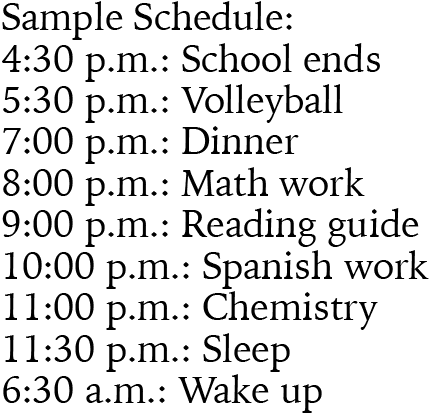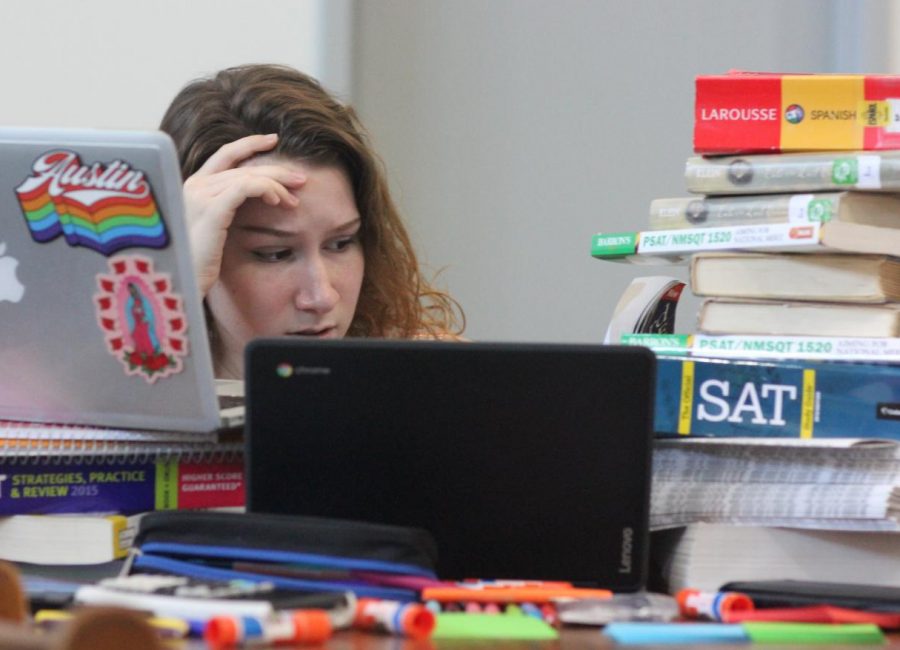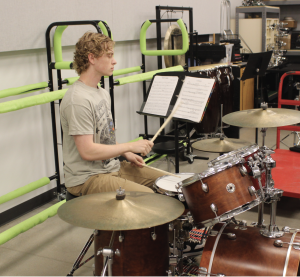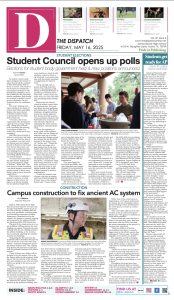Students petition for homework reform
Cade Spencer and Reagan Zuniga
A SEA OF PAPER: Senior Elizabeth Cluchey poses as a student overwhelmed by hoards of test preparation, work, and study material. Substantial workloads are a driving cause behind student movements for homework restrictions and policy reforms.
November 13, 2019
 Between school, extracurricular activities, and homework, students find little rest in a constant daily grind.
Between school, extracurricular activities, and homework, students find little rest in a constant daily grind.
Although hefty workloads can cause students to feel overwhelmed and fatigued, it is their perception of the work that can create the most stress. With hours of work, students commonly see their homework as meaningless busy work, a belief that has caused some teenagers to call for homework restrictions.
As of October 25, a Change.org petition hosted by Dripping Springs junior Ian Stinson had 5,258 virtual signatures in support of implementing new limitations on homework.
“My teacher asked us to write a Ted Talk, so my friend and I wrote an abridged version of what is in the petition and presented it in her class,” Stinson said. “I went home and revised the Ted Talk into the petition as a protest to the large amount of work we were receiving.”
Stinson posted his petition on Change.org, a website that allows individuals to create petitions concerning any subject they care about, such as reforms in homework policy.
“Homework is beneficial because it lets you practice skills you need for tests,” junior Alex Johnson said. “However, it harms students by taking too much of their free time with work that is sometimes unnecessary.”
In order to promote change in the community, the petition has been addressed to Governor Greg Abbott and the City of Austin.
“The absence of repetitive homework would grow student’s love of learning,” Stinson said in his petition summary. “They would be able to pursue their own interests, help out with their family chores/responsibilities, and grow up in a healthy way without homework.”
As a consequence of a substantial workload, senior Sarah Israel spends about two hours and thirty minutes on homework every night.
“I think homework can add unnecessary stress when I’m given busy work,” Israel said. “I think the most effective form is any interactive assignment because it makes learning fun and helps you retain stuff better.”
As a teacher of three Pre-AP math classes, Jeff Henson is familiar with the advantages and disadvantages of homework.
“I understand where students are coming from because there are a lot of assignments given in high school that could be perceived as busy work,” Henson said. “We try to keep homework manageable, but there are the topics we cover in Algebra II that require practice.”
After three years of high school, Israel has found that homework is more beneficial when used in certain academic settings.
“I think math should have homework every night because that’s something you have to continually practice to get good at,” Israel said. “In [other classes], studying the way you feel is best for you should be your homework.”
Shari Blevins, who teaches Academic English I, uses independent reading and reflection assignments as activities to improve students’ reading and writing abilities.
“When you do English homework, you are building collections of writing and skills in order to create larger pieces such as essays,” Blevins said. “If you were to eliminate homework, I would worry how those [skills] would be developed because there is simply not enough time in class.”
Math teacher Kelly Flickinger wants to change how students perceive work.
“I want students to use homework as a place to figure out what they know, what they don’t know, and where to go from there,” Flickinger said. “If I can have students say that homework is meaningful and a safe place to fail, then we know we are doing something right.”
If there is reform in the district homework policy, Israel believes that students should have at most one hour and thirty minutes of homework a night.
“I had a project in anatomy that involved making a poster, looking up pictures, and presenting to the class,” Israel said. “I thought it was beneficial because I had to teach my class about it, and I had to make pictures and research a topic.”
As a result of potential homework limitations, Johnson believes that high schoolers could achieve balance in their AP and Pre-AP classes.
“I personally think schools should mostly make homework optional,” Johnson said. “If schools do this, the work would be meaningful for students because they are doing it by choice, and the overall workload would be more meaningful for all.”
When considering a universal homework policy, Henson acknowledges that individual student’s needs would make it difficult to develop a plan that benefits and serves all.
“In my class, we try to walk a fine line between not giving too much and just enough work to where we feel kids can practice the skills they need to know,” Henson said. “I want homework to be a place where students feel safe to make mistakes and learn from them.”
As students from around Austin sign the petition, it has an end goal of 10,000 signatures.
“I don’t think I would sign a petition like that because I think in certain situations homework can be a useful tool,” Johnson said. “I definitely agree that homework needs to be decreased, and I would sign a petition to place limitations on the quantity of assignments each class can give.”
Despite his desire for homework reform, Stinson realizes that such change would require curriculum adjustments at all levels of education.
“Logistically, homework expedites learning, allowing for fewer years of schooling and more efficient class time, and if it was used correctly and in moderation, it would not be as troublesome,” Stinson said. “That being said, I would not protest not having homework.”









